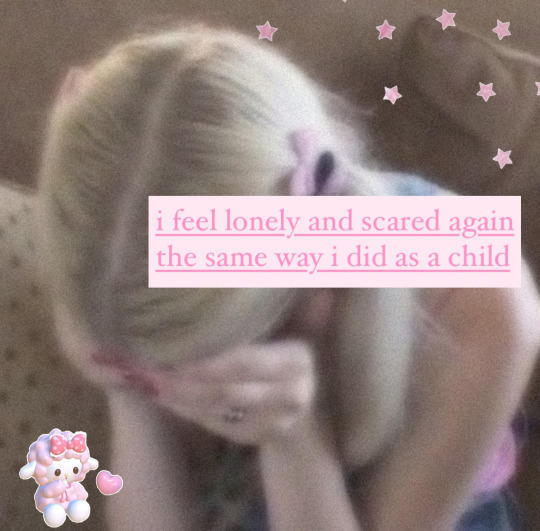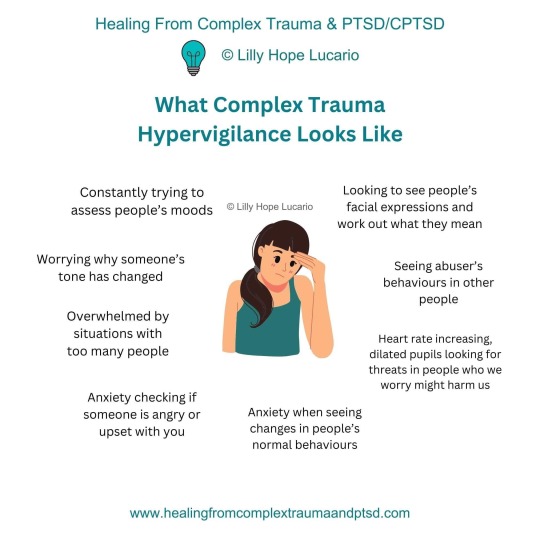#hypervigilance
Text
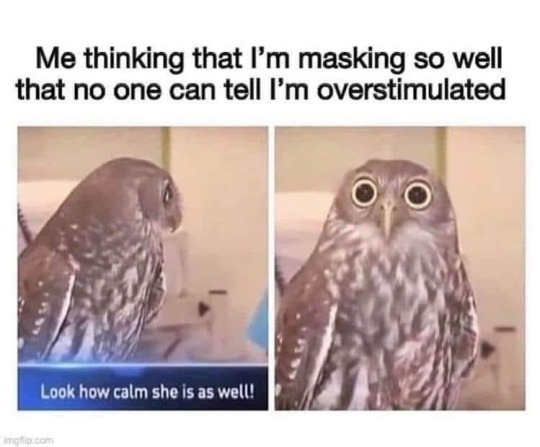
6K notes
·
View notes
Text

825 notes
·
View notes
Text

[Text: This system is easily scared.]
Like/Reblog if you save or use!
#userbox#did#system#did system#osdd1#osdd1 system#scared#easily scared#anxiety#ptsd#hypervigilance#anti endo#endos dni#mod morpho 🦋
232 notes
·
View notes
Text

637 notes
·
View notes
Text
I think the difficult thing with trauma responses and fears is that when people try to comfort you by saying your fears wont happen is that: well actually, they did happen? Why would they not happen again? I have no reason to believe they wont. I want to prepare myself for when they happen again. And the advice of 'Don't assume people are out to get you and hurt you' is so hard to believe because you've experienced that actually, people were out there to hurt you. It's so hard to regain trust in people once it's been broken.
#actuallytraumatized#actuallyabused#traumacore#actuallyptsd#abuse survivor#sa survivor#ptsd#poetry#phoenix posts non poetry#hypervigilance#trust issues
153 notes
·
View notes
Text


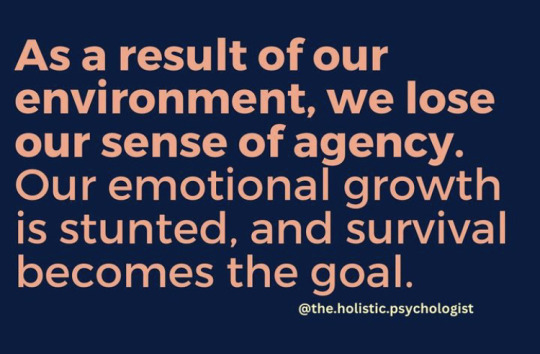


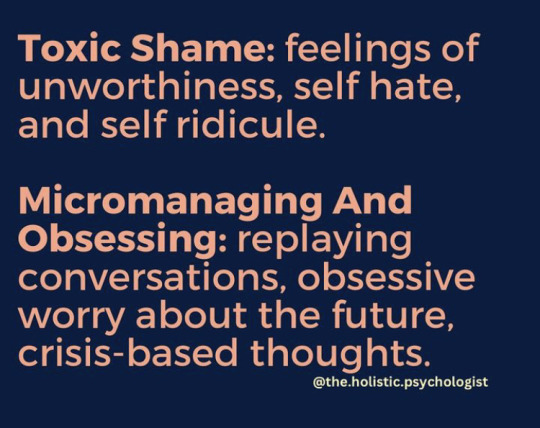
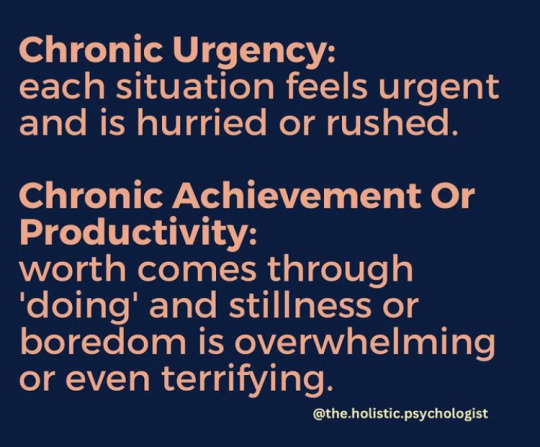
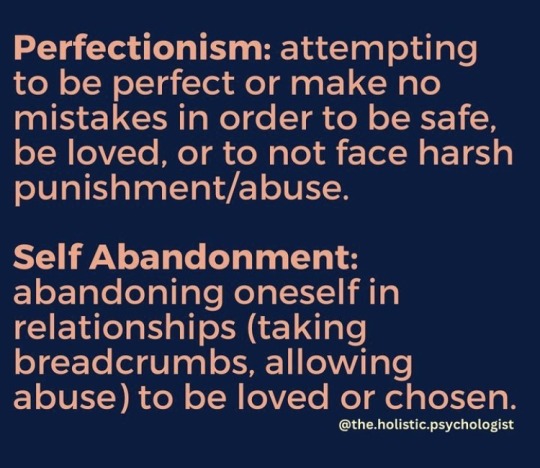
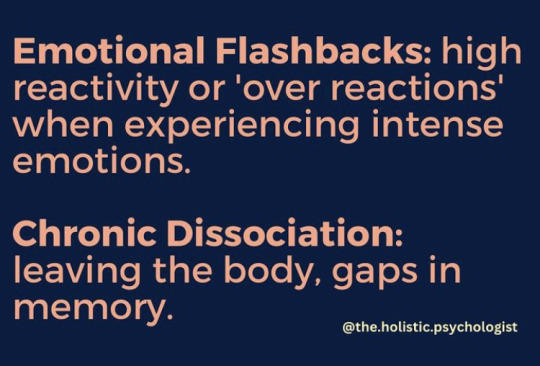
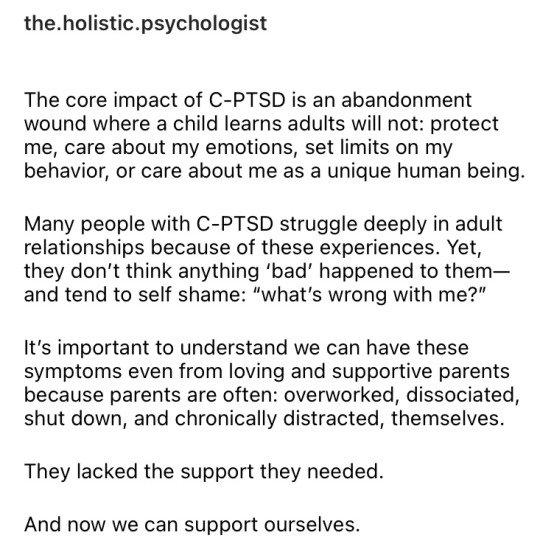
#childhood trauma#complex post traumatic stress disorder#cptsd#cptsd coping#cptsd recovery#hypervigilance#inner critic#trust issues#dysfunctional household#shame#toxic shame#perfectionism#self abandonment#emotional flashbacks#disassociation
471 notes
·
View notes
Text
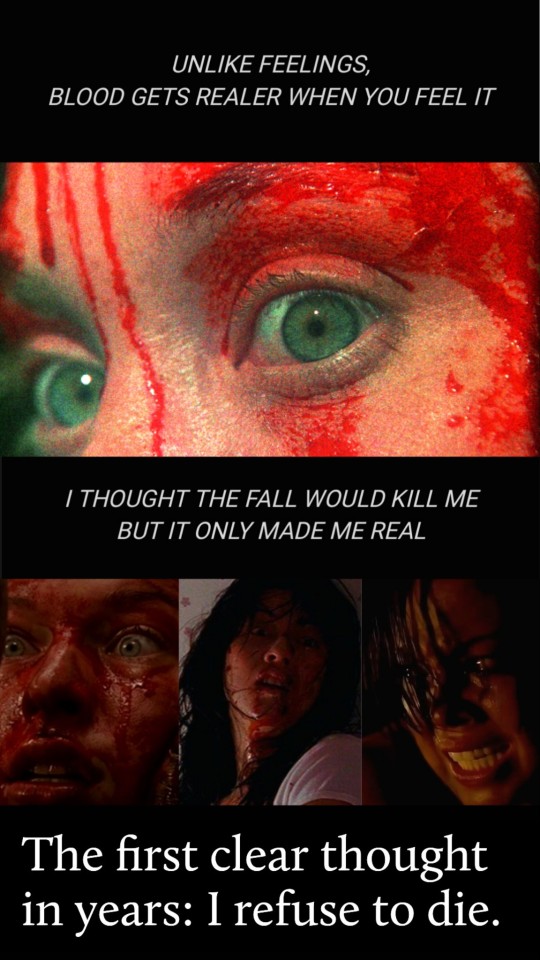


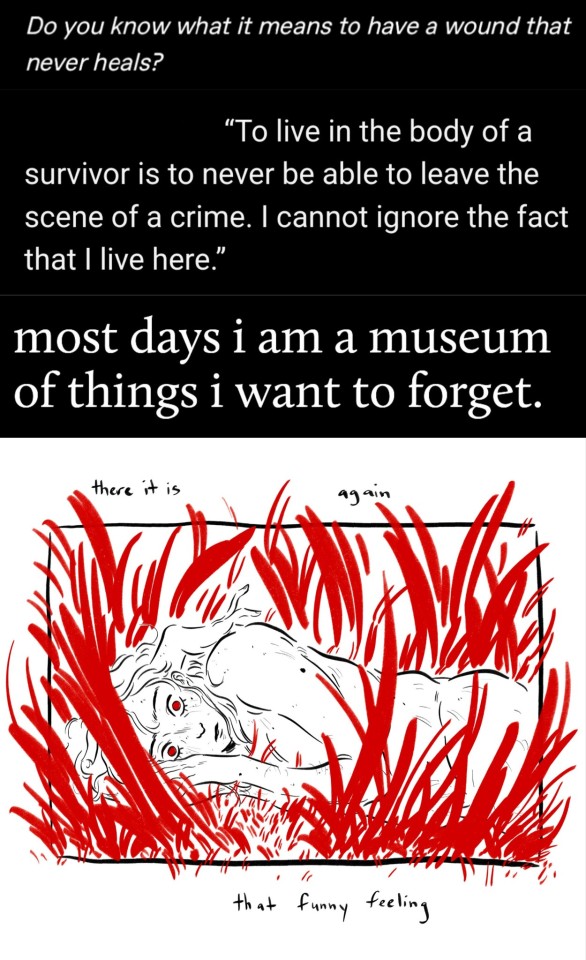
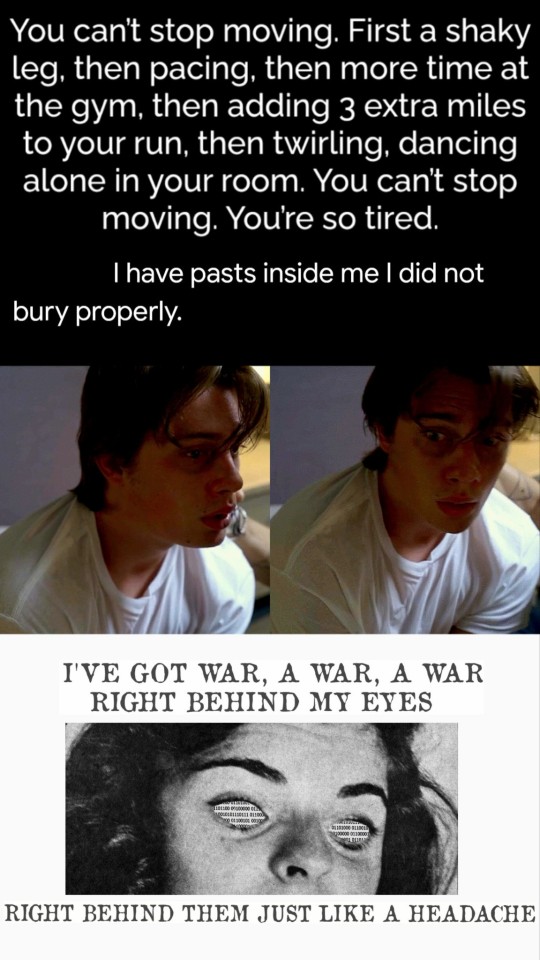



Hypervigilance and Paranoia; I wish I could blink.
Not Even This by Ocean Vuong | Skinny Dipping by Ocean Vuong | Madness: A Bipolar Life by Marya Hornbacher | Courtney Love Prays To Oregon by Clementine Von Radics | Francis Bacon's Last Interview by Francis Giacobetti | Angry Chair by Alice in Chains | Waiting by Marya Hornbacher | The Truth About Grief by Fortesa Latifi | Memorial Drive by Natasha Trethewey | If My Body Could Speak by Blythe Baird | Every Day I Am Trying New Techniques To Make Myself Disappear by E. E. Scott | via @yellowplumfruit | Questions for Ada by Ijeoma Umebinyuo | Intimacy by Marge Piercy | The Blind Assassin by Margaret Atwood | Letter to Violet Dickinson by Virginia Woolf | It’s Sunday Morning in Early November by Philip Schultz | Kait Rokowski
#web weaving#my webweaving#web weave#parallels#words#quote#quotes#out of my collection#comparatives#webweave#compilations#intertextuality#hypervigilance#hypervigilantness#paranoia#tw: paranoia#tw: ptsd#tw: cptsd#ptsd#c ptsd#complex ptsd#ptsd cw#actually ptsd#actually cptsd#living with cptsd#cptsd vent#tw cptsd#my edit#my edits#dissociation
165 notes
·
View notes
Text
i think like. so much would be solved if we normalized the fact that some people do experience delusions and hallucinations. like yes, its something that those people need help with/need more accommodations for, but we could use being more understanding of people with psychotic symptoms in general.
like, i can tell you that at least one person raving about conspiracy theories is someone who experiences delusions, and if we understood that, we wouldn't have such a hard time getting them back to a more grounded perspective.
i am someone who experiences delusions and I do get incredibly triggered by all the unreality bullshit, the simulation theories, all that unreal bullshit, and it is actively negatively impacting people like me.
we could really use a better understanding of those with these symptoms, because acting like having hallucinations/delusions makes you a killer is a take that makes zero sense. Like, genuinely, you have no idea what you're talking about if that's where you immediately go. I can point out a bunch of shit discussing the darkness of humanity and that logic applies to anyone, regardless of mental illness. Delusions and hallucinations don't mean you'll act on anything, it just means that your brain is creating false images or thoughts, and that can get really fucking confusing.
We could use a little more empathy or compassion towards those with these symptoms, because obviously this shit isn't going away for us, just like other disabled people dealing with their disabilities. We are not idiots or monsters, our brain just gives us random false shit sometimes and it really fucking sucks. Be more understanding or I'll telepathically insert false shit into your brain one day, y'all should see the nightmare that some of us have to deal with.
#babey posts#actually delusional#delusions#hallucinations#schizo spectrum#actually psychotic#psychosis#paranoia#hypervigilance#honestly if i wasnt aware of my paranoia. id probably believe a lot of the conspiracy theories out there because of it#like that shit is so strong it makes me feel like everyone's out to get me#and i know they're not! my delusions are just delusions#but for some people. they struggle to tell about that sort of thing and i dont fucking blame them#and we should be more accommodating of people who experience symptoms like this in general#i can handle unreality to an extent. but there's some people who can't handle it at all.#be more respectful and understanding and dont trigger people for fun
180 notes
·
View notes
Photo

#Gotta love that PTSD induced insomnia#I'm so fucking tired#PTSD#PTSD memes#memes#humor#funny#lol#relatable#trauma#trauma memes#cptsd#cptsd memes#depression#depression medication#anxiety#anxiety memes#depression memes#hypervigilance#meme
334 notes
·
View notes
Text
Hypervigilance may start happening unconsciously, unless we learn to recognize it before it has us spiralling downward.
Anytime we start overthinking and worrying or catastrophizing any type of event, we can opt to stop that and go towards a kinder train of thoughts for us, or trying to ground ourselves. It will require a lot of effort, cause it's not easy to change such strong mental patterns, but it can be done with patience and consistency.
When we start over-analyzing what we're going through, let's take a breath and see if it's only our anxiety/habit speaking or there's a reason for that (it's very very rare, but it can happen to find yourself in a life threatening situation -but it'd be obvious though).
So try to soothe yourself while being objective about the situation and gently checking that there's no real threat for you. It's almost impossible to switch off from fear cause it's our strongest and more powerful emotion, still we can learn to react to it differently: to not let it take over us but to be the one sitting with it and having a talk.
Grounding yourself when you start getting overwhelmed could be a way to calm down a little: through visualizations, meditation, breathing technique, music, watching something comforting, holding/touching comfortable/soft things, drinking water or something tasty, taking a shower or a walk, trying to find silence or getting away from too noisy/smelling places; covering yourself with heavy blankets (unless it feels like you're out of breath ofc: having blankets over you generally may feel like having another body near and be comforting, but we're all different and have different shades of reaction to fear, so only work with what feels comfortable for you and any specific situation).
It's okay to have fallbacks while working on fear and hypervigilance, it takes time and patience, do not criticize yourself, you're already doing amazingly.
#words#healing#positivity#important#self love#positive thinking#thoughts#healingjourney#self healing#love yourself#fear#hypervigilance#tw trauma#trauma#emotions#emotional growth#emotional health#spilled journal#spilled words#mental health#recovery#reminders#mental issues#grounding#overthinking
362 notes
·
View notes
Text
What Does PTSD Hypervigilance Look Like?
Tw: activating language, body triggers, nervous system dysregulation, & fight/flight/freeze/fawn responses listed below. Please read with care.
Constantly checking outside by slightly peeking out the hole in the blinds so no one knows youre looking out the window
Listening & memorizing footstep patterns of those who live with you
Memorizing schedules & when people leave the house to know when you can move through the house alone
Tip-toeing or walking in a certain way to make your steps have less noise
Holding your breath or controlling your breathing to make as little noise as possible
Being extra aware of how everything is laid out on the table, where every single item in the pantry, fridge, etc is so when you take something you can put it back undisturbed
Eating food or taking things out of the fridge in a way that makes it seem like you never took anything out
Being constantly aware of how loud your own body is (ie chewing too loud, breathing too loud, walking too loud, not laughing, not crying, mastering the art of being silent)
Making sure the TV was on the same channel/app it was before you turned it on (this one's for us older gens, before we had these smart TVs there was a time when analog TV left a trail of previously watched channels so you'd have to wipe the remote clean before you got caught)
Erasing texts
Having people stored in your phone under false contacts bc your parents/abusers/etc would search your phone
Not able to keep personal photos on your phone for same reasons
Not being able to keep things in your room bc your parents would search your room
Not being able to keep things hidden in your backpack either for the same reasons
Keeping everything hidden at school or asking someone else's to keep them
Not able to keep a diary or journal bc someone would read it even if you asked them not to they wouldn't care and read it anyway
Not having a door on your room or having the door removed
Being told you have no privacy because you "belong" to them
Erasing your tracks with everything you do
Listening for car noises, car door slams, and memorizing the way the engine sounds so you can instantly hear when people get home
Memorizing car sounds or always looking out the window to see if someone has pulled up
Checking every house window in your field of view every second of the day
Constantly watching the front door even though it's closed and locked
Constantly watching your room door
Not being comfortable with things out of your line of sight
Constantly having the TV silent or low volume so you don't make too much noise & also so you can hear better
Memorizing daily life schedules, like when your housemates eat, use the bathroom, get up & walk around so you can be constantly aware of everyone at all times
Not making direct eye contact out of fear that it will spark a conflict
Being constantly aware of tone of voice, inflection, etc in case they're going to verbally abuse or degrade you or humiliate you
Being hyper aware of someone entering your personal space
Flinching
Flinching when someone walks by you
Flinching when someone reaches over you
Flinching when anticipating to get hit
Freezing & paralysis anytime something goes off pattern
Never being able to tell tone over text/ always needing to clarify if someone is mad at you
Not being able to physically get up and walk around the house unless you know you're in a safe position to do so
Not being able to physically get up to use the bathroom unless you're in a position to know it's safe to move around the house undetected
Waiting until everyone goes to bed in order to move around the house or relax
Holding your breath & tensing your muscles
Dissociation & brain fogs
Agoraphobia
Fear of being perceived
Fear of being abandoned
Fear of being seen
Fear of being judged
Fear of being hit
Fear of being alive
Fear of failing
Fear of being alone
Fear of not being good enough
Fawning
Grovelling
People pleasing
Staying silent because it will be less likely to cause a conflict
Hiding your emotions & masking
#recovery#ptsd#trauma#mental health#boundaries#healing#trauma awareness#effects of abuse#hypervigilance#nervous system#fight flight#freeze response#fight flight freeze fawn#codependency#child abuse#abusive parents#toxic parenting#bpd#actually traumatized#actually borderline#paranoia
42 notes
·
View notes
Text
hypervigilance is a horrible misplaced coping mechanism - we mean we absolutely do get that it's originally vital in situations of genuine threat, but it means you're then often stuck with it, and when it kicks off in much more normal circumstances when there's anything faintly resembling conflict, it's a nightmare
apart from anything else, the adrenaline flood tends to turn off empathy and replace it with "try to guess all possible outcomes of all possible choices of action" and for us at least, that so often leads to freezing and being incapable of useful action, which tends to escalate the situation - or it leads to flight and in our case that equals dissociation
yes it's a very hard habit to undo, but it is vital to try to undo it, because once you're flooded with adrenaline then every damn thing feels like a threat and that's very hard to come back from - and that's usually in the middle of a situation that could actually be easily resolved if all that wasn't already going on
anyway what we're trying to say here is that it's worth trying to let this habit go, to slowly slow down its huge flywheel of momentum, because it's not doing anybody any good
and the way to do this isn't through self-punishment, it's through profound kindness to ourselves, for the suffering that caused it and the suffering it causes us
and if anyone's reading this and nodding, we want to say: good luck, all of us - stand down, soldier - we all deserve better coping mechanisms ☀️🌿
76 notes
·
View notes
Text

im sorry that i don’t have much to say anymore. im not as creative as I used to be
#ptsd#actuallymentallyill#tw trauma mention#sa#trauma#actuallytraumatised#hypervigilance#flashbacks#paranoia#ok to rb#trauma venting#trauma vent
25 notes
·
View notes
Text

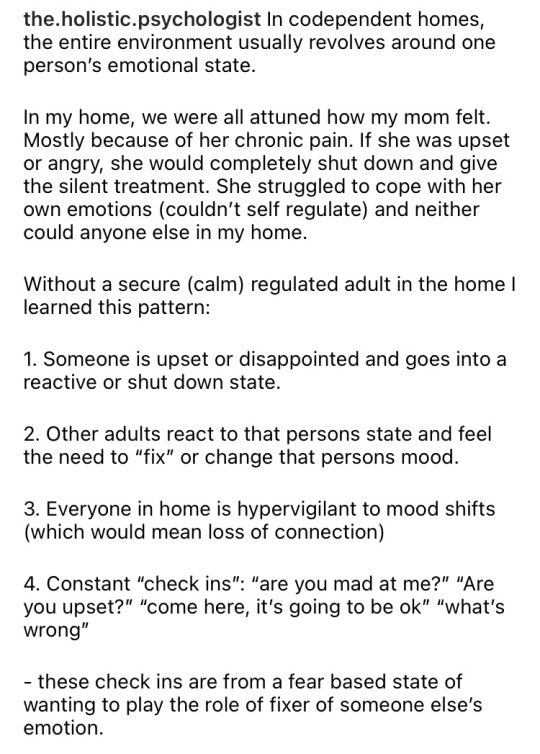
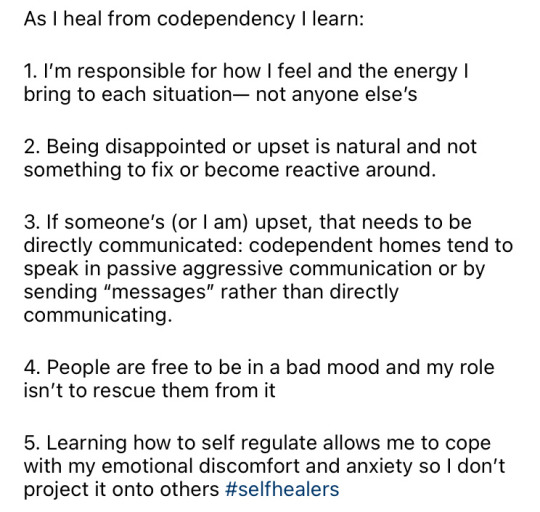
#mental health#self care#recovery#healing#codependent relationships#codependency#hypervigilance#trauma response
441 notes
·
View notes
